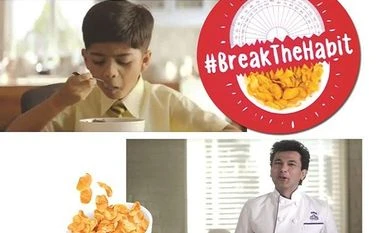Last month, Nestle India, among the country's leading packaged food companies, indicated it would now position itself as a breakfast major. Not surprisingly so, given that the majority of food labels under the Nestle brand umbrella are all part of popular breakfast menus and; besides, its longstanding association with dairy staples automatically lent heft to its new positioning, the company indicated. Its entry is being tracked with keen interest as the other global majors in the breakfast ring, Kellogg’s and PepsiCo, have steadily raised their stakes in the Indian market over the years. At the same time, Indian brands have leveraged their understanding of the local palate to offer convenient and affordable alternatives at the table too.
“Not just Nesplus, the breakfast cereal we launched in July, but even coffee, yoghurt, oat noodles and milk are all breakfast items. They are part of the breakfast menu of individuals in general and can be considered as breakfast items (from the firm's portfolio standpoint),” said Suresh Narayanan, chairman and managing director, Nestle India.
Industry estimates peg the breakfast cereal market in India, which includes cornflakes, oats and muesli, in the region of Rs 18-19 billion, projected to touch Rs 25-26 billion by 2020. Kellogg’s is the leader in breakfast cereals in India with a market share of around 56 per cent, according to market research firm Euromonitor. PepsiCo is estimated to have a share of 15-20 per cent.
In recent years, local players such as Bagrry's and Marico have also stepped into the category with new and exciting products (including oats, muesli etc). The other side of the domestic breakfast market are Indian snacks, companies such as MTR Foods (owned by Norwegian major Orkla) are among the few organised players here with both a ready-to-eat and ready-to-cook range, of traditional snacks.
With a large player like Nestle around, companies have to take strong measures to ring-fence themselves from future damage, say experts. Deepika Warrier, vice president, nutrition category, PepsiCo India, says, “We welcome new entrants. They will contribute in upgrading consumers from unpackaged to packaged food; also improve local sourcing economics. We believe there is much potential to grow the oats category, where we are leaders.”
PepsiCo has taken a three-pronged approach in breakfast, speaking to millennials and young adults through thematic campaigns and digital activations, launching small packs and pushing distribution into north and east in addition to the south market, a strong consumer of oats. The third part includes tapping into new consumer trends. This involves combining the goodness of oats and Indian breakfast items in a new ready-to-cook range, stepping into the dairy segment with a ready-to-drink product that combines oats and milk and expanding the core oats range with a whole-grain option.
Kellogg’s, on the other hand, is looking to make its products accessible and affordable. “We continue to focus on our multigrain, nutritious and tasty cereals. Simultaneously, we are always looking out for opportunities to serving more consumers,” Mohit Anand, managing director, India and South Asia, Kellogg’s India, said. “What is helping us attract more people is the rise in the trend of 'health and wellness'. Breakfast cereals are at the core of this trend. With consumers seeking more convenient meal options, Kellogg's and hence the entire category, is only poised to grow,” he adds.
MTR Foods, in the interim, is looking to strengthen its ready-to-eat and ready-to-cook range of breakfast products. Company executives say the effort is tied in with the growing acceptance of convenience foods as a meal option during breakfast.
Warrier endorses this point, saying that 40 per cent of nutrition needs of an individual are skewed towards breakfast. “As more and more consumers look for healthier options, we find that they are seeking nutritional benefits combined with convenience and yet, they do not want to compromise on taste,” she says.
Anand, meanwhile, believes that one in four urban Indians actually skip breakfast and nearly 70 per cent have a nutritionally inadequate breakfast, led in part by stressed and busy working lives. “This presents a strong case for the increase in consumption of packaged, nutritious and convenient options,” he says.
Kellogg’s has just unveiled a campaign called ‘#BreakTheHabit’, aimed at building awareness among consumers to stop skipping breakfast. The initiative comes as the government puts the spotlight on nutrition via the Rashtriya Poshan Maah (or National Nutrition Month) in September. Kellogg’s has also roped in celebrities and chefs to speak of the need to eat right and start the day well with a nutritious diet.
PepsiCo is also a veteran when it comes to using the wellness-health card to fortify its brand as a breakfast offering. It has been pushing its campaign 'Fuel for the Real Fit' (since 2017) to drive home the message of nutrition and wellbeing to its target audience. It also has Chef Vikas Khanna as a nutrition ambassador.
Clearly, Nestle has a fight on its hands. Whatever be the outcome of the ensuing battle, the conversation at the morning table is shaken and stirred.
Unlock 30+ premium stories daily hand-picked by our editors, across devices on browser and app.
Pick your 5 favourite companies, get a daily email with all news updates on them.
Full access to our intuitive epaper - clip, save, share articles from any device; newspaper archives from 2006.
Preferential invites to Business Standard events.
Curated newsletters on markets, personal finance, policy & politics, start-ups, technology, and more.
)